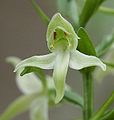- Platanthera chlorantha
-
 Platanthère à fleurs vertes
Platanthère à fleurs vertes
Platanthera chlorantha Classification classique Règne Plantae Sous-règne Tracheobionta Division Magnoliophyta Classe Liliopsida Sous-classe Liliidae Ordre Orchidales Famille Orchidaceae Genre Platanthera Nom binominal Platanthera chlorantha
(Custer) Rchb., 1828Classification phylogénétique Ordre Asparagales Famille Orchidaceae Statut CITES :  Annexe II ,
Annexe II ,
Révision du 01/07/75
D'autres documents multimédia
sont disponibles sur CommonsPlatanthera chlorantha, le platanthère à fleurs vertes, est une orchidée terrestre européenne.
Autres noms communs : Platanthère à fleurs verdâtres, orchis des montagnes, orchis verdâtre.
Sommaire
Description
Plante élancée à grandes feuilles oblongues (2 à 3), à inflorescence dense de 10 à 30 fleurs blanc-verdâtre, odorantes, labelle étroit en forme de langue, base des pollinies écartée.
L'orchis verdâtre (Platanthera chlorantha) se confond facilement avec la platanthère à deux feuilles (Platanthera bifolia). Il s'en distingue par ses loges polliniques divergentes, celles de la platanthère à deux feuilles étant parallèles.
Floraison
Habitat
Plante de pleine lumière, sur substrats acides ou humides. dépression marécageuses en montagne.
Répartition
Eurasiatique des régions tempérées et méditerranéenne. Rare et localisée.
Vulnérabilité
L'espèce est classée "LC" : Préoccupation mineure[1].
Philatélie
Cette espèce est représentée sur des timbres préoblitérés français émis en 2003 et en 2007.
Galerie
Références
- La Liste rouge des espèces menacées en France. Orchidées de France métropolitaine. MNHN, Dossier de presse - 6 octobre 2009.
Liens externes
- Référence Belles fleurs de France : Platanthera chlorantha (fr)
- Référence Tela Botanica (France métro) : Platanthera chlorantha (fr)
- Référence NCBI : Platanthera chlorantha (en)
- Référence CITES : espèce Platanthera chlorantha (Custer) Rchb. (+ répartition) (sur le site de l’UNEP-WCMC) (fr+en)
- Référence CITES : taxon Platanthera chlorantha (sur le site du ministère français de l'Écologie, du Développement durable, des Transports et du Logement) (fr)
Catégories :- CITES annexe II
- Flore (nom scientifique)
- Orchidaceae
Wikimedia Foundation. 2010.





